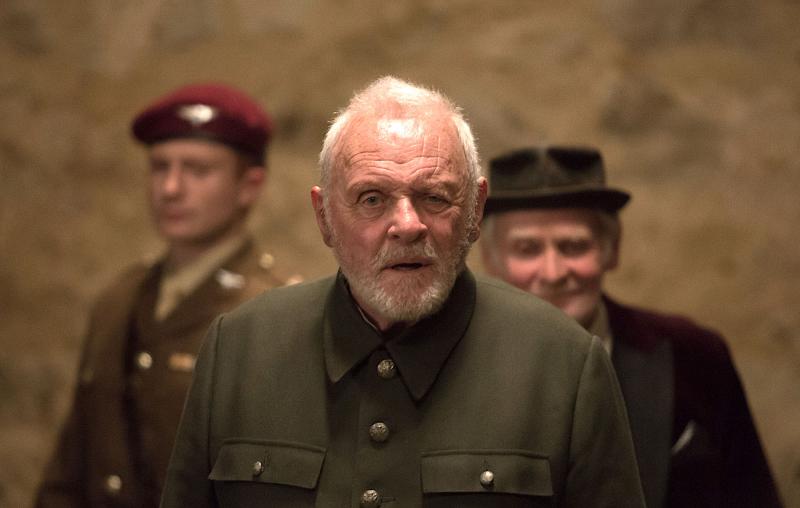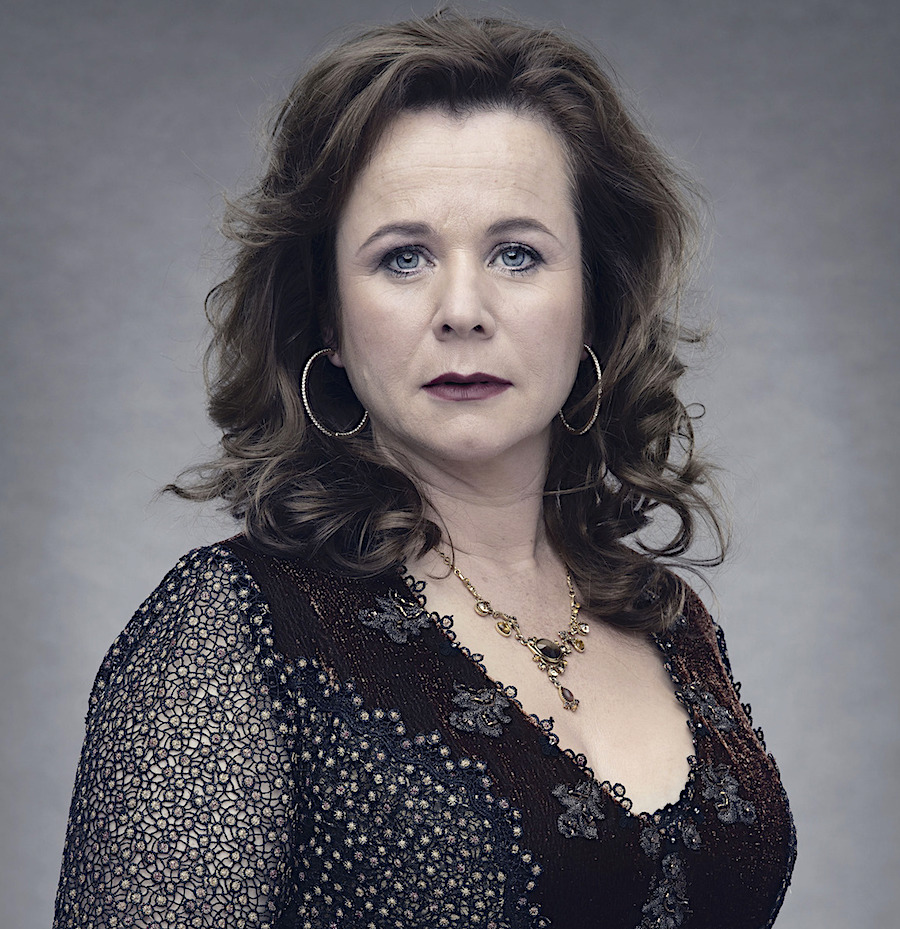King Lear, BBC Two review - modernised TV adaptation is a mixed blessing | reviews, news & interviews
King Lear, BBC Two review - modernised TV adaptation is a mixed blessing
King Lear, BBC Two review - modernised TV adaptation is a mixed blessing
A towering Anthony Hopkins just about saves the day

Some have contended that King Lear is unstageable, and perhaps it’s unfilmable too.
Although it’s unusual to find King Lear opening with nighttime scenes of a glittering, contemporary City of London, including the Tower thereof, it’s difficult to feel that this setting helps us to better understand Shakespeare’s story of feudal bloodletting and ferocious familial infighting. As the story progresses, the idea of a crippling civil war ripping asunder our septic isle is supposed to be evoked by stock shots of jet aircraft, artillery, Apache helicopters and violent firefights in a blighted suburbia, but all this is really just a distraction from the language where the play’s various truths lie. It's like updating operas by Handel or Mozart – you can transport them to fascist Italy or a ski resort in Colorado, but the music will insist on telling its own story in its own voice.
 Eyre’s smartest move was recruiting Anthony Hopkins for the title role, and the combustible Welshman takes it to the limit. His face battered and pocked like an aerial photograph of the battlefields of the Somme, his Lear is irascible, irrational, pugnacious, and not used to having his slightest whim contradicted. He has a particular way of pronouncing the word “love”, turning it into two syllables and making it sound more like a blunt instrument than a term of endearment.
Eyre’s smartest move was recruiting Anthony Hopkins for the title role, and the combustible Welshman takes it to the limit. His face battered and pocked like an aerial photograph of the battlefields of the Somme, his Lear is irascible, irrational, pugnacious, and not used to having his slightest whim contradicted. He has a particular way of pronouncing the word “love”, turning it into two syllables and making it sound more like a blunt instrument than a term of endearment.
He sucks up the oleaginous flattery of daughters Goneril and Regan – and what else would he expect after inviting them to take part in an obsequiousness contest in order to be awarded chunks of his kingdom? – but the prim insistence of Cordelia (Florence Pugh) that she will “love your majesty according to my bond, no more, no less” drives the old tyrant into a stupendous rage. Cordelia is banished, which puts paid to her planned marriage to the Duke of Burgundy (who, perplexingly, is dressed like the king of Matabeleland, presumably in accordance with some BBC diversity directive). Kent (a pleasingly avuncular Jim Carter) also finds himself cast out by the despotic Lear when he bluntly tells the sovereign that “thou dost evil”.
Lear’s journey into madness is the play’s key signature, but where this version scores highest is in treating Lear’s morbid decline as a progression through the clinical stages of dementia. The irrational rages, failure to recognise familiar comrades, and the torrent of vile abuse he heaps on Regan when she’s none too enthusiastic about inviting him and his entourage to crash at her place indefinitely are symptoms which will be painfully familiar to many, and his desperate line “Oh let me not be mad” intimates that he’s not entirely oblivious to his condition. "Thou shouldst not have been old til thou hadst been wise," the Fool (Karl Johnson) tells him.
 I don’t know the original text well enough to spot where Eyre has made cuts, but Cordelia’s role feels oddly truncated – she barely seems to have registered in the viewer’s consciousness before Lear is dragging her corpse across the stage in a sack and delivering “thoul’t come no more”, very touchingly it must be said. The evil daughters fare better, with Emma Thompson’s Goneril (pictured above) reminiscent of a predatory and contemptuous Agatha Christie murderess and Emily Watson (pictured above left) bringing some Moors Murderers sadism to Regan. And there’s some surprising light relief from, of all people, Christopher Eccleston, who plays Oswald with a camp skittishness hilariously at odds with his reputation for dour obsessiveness.
I don’t know the original text well enough to spot where Eyre has made cuts, but Cordelia’s role feels oddly truncated – she barely seems to have registered in the viewer’s consciousness before Lear is dragging her corpse across the stage in a sack and delivering “thoul’t come no more”, very touchingly it must be said. The evil daughters fare better, with Emma Thompson’s Goneril (pictured above) reminiscent of a predatory and contemptuous Agatha Christie murderess and Emily Watson (pictured above left) bringing some Moors Murderers sadism to Regan. And there’s some surprising light relief from, of all people, Christopher Eccleston, who plays Oswald with a camp skittishness hilariously at odds with his reputation for dour obsessiveness.
Still, there are episodes in Lear which will remain problematic whatever you do with them. The bizarre moment when poor, blinded Gloucester (Jim Broadbent) isn’t sure whether or not he has fallen off a high cliff on the Kent coast doesn’t so much beggar belief as make you wonder if Shakespeare got pranked by a rival playwright. Elsewhere, the modernised setting brings more bathos than pathos. Gloucester’s progress to Dover, aided by his prodigal son Edgar (a slightly-too-hysterical Andrew Scott), finds the two of them wandering along beside what must presumably be the A2, as trucks and Ford Focuses whizz past incongruously. The “blasted heath” has become a disused quarry, while depicting the crazed, destitute Lear as a homeless man pushing a supermarket trolley full of rubbish round a shopping precinct in Dover is a kitchen sink too far.
Ian McKellen brings his Chichester Lear to the West End in July. I daresay it will make an instructive comparison.
rating
Explore topics
Share this article
Add comment
The future of Arts Journalism
You can stop theartsdesk.com closing!
We urgently need financing to survive. Our fundraising drive has thus far raised £49,000 but we need to reach £100,000 or we will be forced to close. Please contribute here: https://gofund.me/c3f6033d
And if you can forward this information to anyone who might assist, we’d be grateful.

Subscribe to theartsdesk.com
Thank you for continuing to read our work on theartsdesk.com. For unlimited access to every article in its entirety, including our archive of more than 15,000 pieces, we're asking for £5 per month or £40 per year. We feel it's a very good deal, and hope you do too.
To take a subscription now simply click here.
And if you're looking for that extra gift for a friend or family member, why not treat them to a theartsdesk.com gift subscription?
more TV
 theartsdesk Q&A: director Stefano Sollima on the relevance of true crime story 'The Monster of Florence'
The director of hit TV series 'Gomorrah' examines another dark dimension of Italian culture
theartsdesk Q&A: director Stefano Sollima on the relevance of true crime story 'The Monster of Florence'
The director of hit TV series 'Gomorrah' examines another dark dimension of Italian culture
 The Monster of Florence, Netflix review - dramatisation of notorious Italian serial killer mystery
Director Stefano Sollima's four-parter makes gruelling viewing
The Monster of Florence, Netflix review - dramatisation of notorious Italian serial killer mystery
Director Stefano Sollima's four-parter makes gruelling viewing
 The Diplomat, Season 3, Netflix review - Ambassador Kate Wyler becomes America's Second Lady
Soapy transatlantic political drama keeps the Special Relationship alive
The Diplomat, Season 3, Netflix review - Ambassador Kate Wyler becomes America's Second Lady
Soapy transatlantic political drama keeps the Special Relationship alive
 The Perfect Neighbor, Netflix review - Florida found-footage documentary is a harrowing watch
Sundance winner chronicles a death that should have been prevented
The Perfect Neighbor, Netflix review - Florida found-footage documentary is a harrowing watch
Sundance winner chronicles a death that should have been prevented
 Murder Before Evensong, Acorn TV review - death comes to the picturesque village of Champton
The Rev Richard Coles's sleuthing cleric hits the screen
Murder Before Evensong, Acorn TV review - death comes to the picturesque village of Champton
The Rev Richard Coles's sleuthing cleric hits the screen
 Black Rabbit, Netflix review - grime and punishment in New York City
Jude Law and Jason Bateman tread the thin line between love and hate
Black Rabbit, Netflix review - grime and punishment in New York City
Jude Law and Jason Bateman tread the thin line between love and hate
 The Hack, ITV review - plodding anatomy of twin UK scandals
Jack Thorne's skill can't disguise the bagginess of his double-headed material
The Hack, ITV review - plodding anatomy of twin UK scandals
Jack Thorne's skill can't disguise the bagginess of his double-headed material
 Slow Horses, Series 5, Apple TV+ review - terror, trauma and impeccable comic timing
Jackson Lamb's band of MI5 misfits continues to fascinate and amuse
Slow Horses, Series 5, Apple TV+ review - terror, trauma and impeccable comic timing
Jackson Lamb's band of MI5 misfits continues to fascinate and amuse
 Coldwater, ITV1 review - horror and black comedy in the Highlands
Superb cast lights up David Ireland's cunning thriller
Coldwater, ITV1 review - horror and black comedy in the Highlands
Superb cast lights up David Ireland's cunning thriller
 Blu-ray: The Sweeney - Series One
Influential and entertaining 1970s police drama, handsomely restored
Blu-ray: The Sweeney - Series One
Influential and entertaining 1970s police drama, handsomely restored
 I Fought the Law, ITVX review - how an 800-year-old law was challenged and changed
Sheridan Smith's raw performance dominates ITV's new docudrama about injustice
I Fought the Law, ITVX review - how an 800-year-old law was challenged and changed
Sheridan Smith's raw performance dominates ITV's new docudrama about injustice
 The Paper, Sky Max review - a spinoff of the US Office worth waiting 20 years for
Perfectly judged recycling of the original's key elements, with a star turn at its heart
The Paper, Sky Max review - a spinoff of the US Office worth waiting 20 years for
Perfectly judged recycling of the original's key elements, with a star turn at its heart

Comments
Hilarious! I enjoyed reading